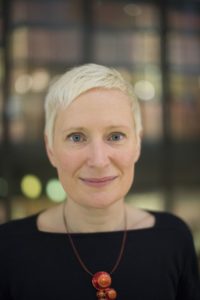I'm currently a collaborator on the Flickr Foundation's Data Lifeboat project (funded by the NEH on a Digital Humanities Advancement Grant).
Here's a link to my most recent and upcoming talks (see also my ORCID page) and some generic conference bios:
50-ish words, 2023: Dr Mia Ridge is the British Library’s Digital Curator for Western Heritage Collections. Part of the Digital Research team, she provides advice and training on computational research, AI / machine learning and crowdsourcing. A Co-Investigator on Living with Machines (2018-23), she co-curated the Living with Machines exhibition with Leeds Museums and Galleries (2022-23).
Longer bio: Dr Mia Ridge is the British Library’s Digital Curator for Western Heritage Collections. As part of the Library’s Digital Scholarship team, she helps enable innovative research based on the British Library’s digital collections, offering support, training and guidance on applying computational research methods to historical collections.
In 2021, she co-authored The Collective Wisdom Handbook: perspectives on crowdsourcing in cultural heritage. This followed her successful bid as Principal Investigator to the Arts and Humanities Research Council for 'Collective Wisdom'.
She was a Co-Investigator on the Living with Machines project (2018-23), where she led public engagement with digital scholarship and heritage collections through crowdsourcing. Living with Machines was a major inter-disciplinary historical and data science research project analysing digitised sources at scale to provide new insights into mechanisation in the industrial revolution. Her work engaged over 5,500 volunteers in research tasks related to the Living with Machines project. She co-curated the Living with Machines exhibition with Leeds Museums and Galleries, at Leeds City Museum July 2022 – January 2023.
Previous projects involve crowdsourcing the transcription of historical playbills, and experimenting with machine learning-based methods with library collections.
She is a member of several project advisory boards in the fields of digital humanities and digital cultural heritage, and has undertaken peer review for a range of journals and conference programmes. She has led several computer science and digital humanities student projects applying digital scholarship, data mining and visualisation methods to collections within the British Library. She was also a convenor of the Institute of Historical Research's Digital History seminar.
Mia's research on aspects of human-computer interaction and digital cultural heritage, particularly on crowdsourcing in galleries, libraries, archives and museums, has an international reputation. Her work in digital scholarship is informed by her PhD in digital humanities (Department of History, Open University), titled ‘Making digital history: The impact of digitality on public participation and scholarly practices in historical research’. Her edited volume, 'Crowdsourcing our Cultural Heritage’ (Ashgate) was published in October 2014 and subsequently issued in paperback. In 2021 she led the Collective Wisdom project in writing The Collective Wisdom Handbook: perspectives on crowdsourcing in cultural heritage.
As Chair of the Museums Computer Group (MCG) for 8 years (2011 to 2017, having served as a committee member from 2007), she has an excellent awareness of the museum sector. Mia was an elected member of the Executive Council of the Association for Computers and the Humanities (ACH) from 2013-2017.
Mia has published, taught and presented widely on her key areas of interest including: user experience design and human-computer interaction, open cultural data, digital history, and audience engagement and participation in the cultural heritage sector.
In addition to her doctorate, Mia has post-graduate qualifications in software development (RMIT University, Melbourne, 2001) and an MSc in Human-Centred Systems (City University, London, 2011).
Formerly Lead Web Developer at the Science Museum Group, Mia has also worked for the Museum of London. Her career began in Australia with roles at Melbourne Museum and Vicnet at the State Library of Victoria. She has worked internationally as a business analyst, usability consultant and web programmer in the cultural heritage and commercial sectors. Mia has been awarded international fellowships at Trinity College Dublin/CENDARI , Ireland (2014), the Polis Center Institute on ‘Spatial Narrative and Deep Maps’ (2012) and the Roy Rosenzweig Center for History and New Media One Week One Tool program (2013, where she helped create the award-winning Serendip-o-matic), and had short Residencies at the Powerhouse Museum (2012) and the Cooper-Hewitt Design Museum (2012). Mia is also known for her work on crowdsourcing metadata games for museums.
While at the Science Museum, Mia held the first ever museum mashup competition, helped the Science Museum's Centenary Icons poll hit the front page of the BBC News, and organised the release of over 200,000 collections records as open data. Mia has also worked for Culture24's Let's Get Real projects and a range of freelance clients. She has maintained a wiki listing museum, gallery, library and archive APIs and machine-readable data sources for open cultural data and cool things made with them since 2009.
She blogs at https://www.openobjects.org.uk/ and posts at https://hcommons.social/@mia / @[email protected]. In the past she was @mia_out on twitter.
If I'm presenting at your event, please feel free to edit a version of the bio above to fit your space requirements. Click through the headshot for a larger version.
My PhD investigated the impact of digitality on scholarly practice and 'making history'.
Some publications are listed or accessible at my ORCID page, my Open University repository page, Humanities Commons page and my Zotero page.
Originally from Melbourne, Australia, I now live in London (via Amsterdam and Oxford, and work or fellowships in the US, Ireland and Turkey). I started as a Arts student, played around in multimedia, and eventually graduated as a software engineer. After working as a museum technologist for over a decade, I did a PhD in digital history and I now work in digital scholarship at a library.
I'm a member of various conference Programme Committees (Museums and the Web, Museum Computer Network) and academic project Steering Groups (Commodity Histories, Social Interpretation). I was also a member of the Arts and Humanities Research Council funded Thinktank 'UK Museums and the Semantic Web' in 2006/7 and of JISC's 'Developer Focus' group that works with their DevCSI project to improve the developer community in higher education.
